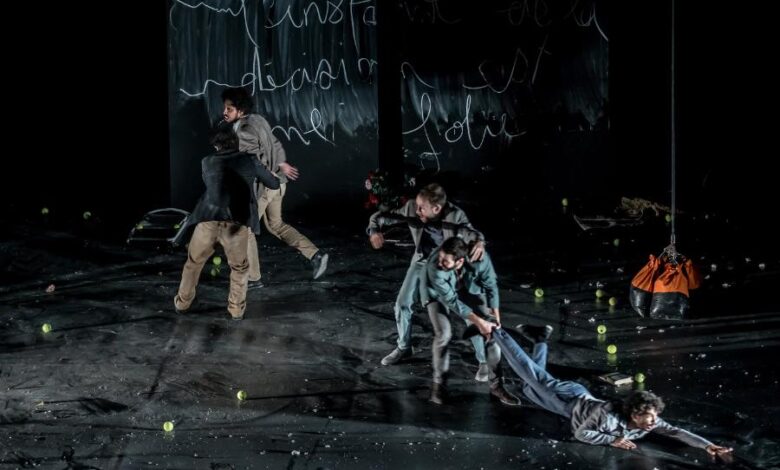I have always been fascinated by Pinter’s work: a fascination that led, with considerable good fortune, to me conducting an interview with the great writer at his London home in 2001, some seven years before his death. Few of his dramas contain more intriguing possibilities, more bleakly disquieting comedy or more terrifying political implications than The Birthday Party.
In the play, the sinisterly ambiguous, suit-wearing duo of Goldberg and McCann arrive at a down-at-heel English seaside boarding house to disturb the eponymous celebration that is planned for the birthday of the young former pianist Stanley Webber. What power – criminal, political or religious – the men represent is unclear. What is certain is that they have power, even if it is only, ultimately, the power of physical and psychological violence.
In truth, Stein’s production would have been better served had it been staged in the splendid main house of TMJB, rather than next door at Escola D. António da Costa in the festival’s open air theatre. The claustrophobia of Pinter’s play does not lend itself particularly well to alfresco performance, but the Tieffe Theatre staging managed to impress nonetheless.
At face value, the production looks like a fairly down-the-line, conventional rendering of this well known drama. However, as ever with Stein, intelligent directorial interventions bring another dimension to the play.
In every aspect of the piece, the director, somehow, increases the emotional volume. This is true from the exaggeratedly comic walk of Fernando Maraghini’s boarding house owner Petey to the disquieting tryst between Goldberg and the much younger Lulu (which is conducted under a white sheet, as if in a surrealist painting by René Magritte).
Stein’s genius is that he manages to enhance the emotional “volume” and the colour of a play without losing any of its nuances. Boasting a tremendous, Italian cast, it is – right up to the terrifying futility of its conclusion – a staging worthy of any international festival.
On the evenings immediately after the fine Pinter production, FdA offered two quite distinct shows from the physical theatre tradition of Nouveau Cirque (“New Circus”). At TMJB the French group Yoann Bourgeois Art Company presented Minuit, a seductive combination of breathtaking acrobatics, gorgeous lighting design and a cleverly constructed live musical score (including innovative use of the harp).
The physical aspect – which includes a man repeatedly falling from a set of stairs, then bouncing back up onto the staircase from a large trampoline – is, often, genuinely awe-inspiring. A woman, her lower legs encased in a semi-circular base (somewhat like one of the 1970s American toys known as Weebles), cannot fall over, no matter how severely life buffets her.
This is acrobatic circus performance placed in a beautiful, highly artistic context. By contrast, Yoann Bourgeois’s compatriots Galactik Ensemble trade in beauty for visual and physical chaos.
In Optraken, performed, appropriately, in the outdoor theatre at the Escola, the five young men of the company create extraordinary visual illusions and execute phenomenally daring stunts. As they do so, they evoke a world in which the individual human being is in danger of being overwhelmed by the mayhem around them.
From the COVID pandemic, to the climate crisis, and wars from Ethiopia, to Yemen and Ukraine, there has been plenty of havoc around. In this show, the chaos is a series of metaphors in which attempts to create a stable normality are disrupted violently by falling plant pots, exploding candy and rapid-fire tennis balls.
All of which requires amazing speed and agility on the part of the performers. It also demands the kind of technical proficiency one would usually expect only of the teams behind the Goes Wrong theatre shows.
As the characters realise that the madness of the world requires a collective response, they write phrases (helpfully, for their Almada audience, in Portuguese) on their wheeled walls-cum-chalk boards. One phrase translates simply as “the moment of decision is crazy.”
As their entire set collapses around them, exposing the city beyond the theatre space, we are left to reflect on an hour of glorious insanity that epitomises the marriage of acrobatics and meaning that is Nouveau Cirque.
Festival de Almada continues until July 18: festival.ctalmada.pt
